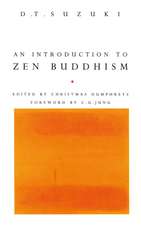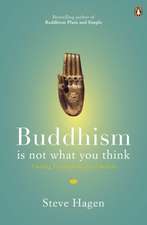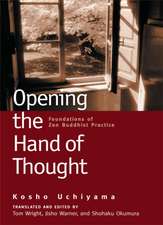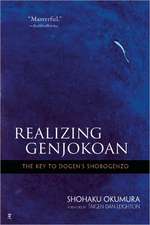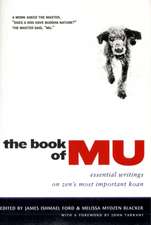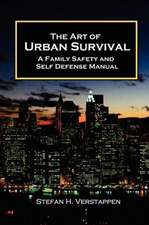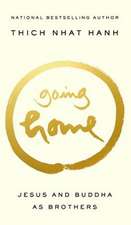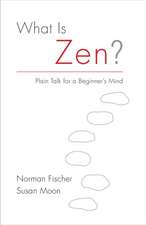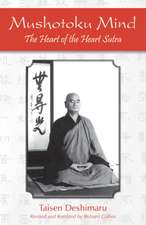Bones of the Master: A Journey to Secret Mongolia
Autor George Craneen Limba Engleză Paperback – 30 apr 2001
Nearly forty years later Tsung Tsai — now an old master himself — persuades his American neighbor, maverick poet George Crane, to travel with him back to his birthplace at the edge of the Gobi Desert.
They are unlikely companions. Crane seeks freedom, adventure, sensation. Tsung Tsai is determined to find his master's grave and plant the seeds of a spiritual renewal in China. As their search culminates in a torturous climb to a remote mountain cave, it becomes clear that this seemingly quixotic quest may cost both men's lives.
Preț: 137.05 lei
Nou
Puncte Express: 206
Preț estimativ în valută:
26.23€ • 27.03$ • 22.15£
26.23€ • 27.03$ • 22.15£
Carte disponibilă
Livrare economică 06-12 februarie
Livrare express 24-30 ianuarie pentru 21.87 lei
Preluare comenzi: 021 569.72.76
Specificații
ISBN-13: 9780553379082
ISBN-10: 0553379089
Pagini: 320
Ilustrații: TWO 8-PAGE B/W PHOTO INSERTS 1 MAP
Dimensiuni: 155 x 231 x 20 mm
Greutate: 0.37 kg
Editura: Bantam
ISBN-10: 0553379089
Pagini: 320
Ilustrații: TWO 8-PAGE B/W PHOTO INSERTS 1 MAP
Dimensiuni: 155 x 231 x 20 mm
Greutate: 0.37 kg
Editura: Bantam
Notă biografică
George Crane is a poet as well as a translator of poems from the Chinese (A Thousand Pieces of Snow, co-authored with Tsung Tsai). He lives in upstate New York. Bones of the Master is his first nonfiction work.
Extras
The Last Days of Puu Jih
October 1959: Crow Pull Mountain, Inner Mongolia
The ninth day of the tenth month. The Yellow Season. Tsung Tsai woke at three, two hours before first light. In the dry grass beyond the monastery's stone and mud-brick walls, the last slow-dying cicadas scraped their wings.
The monk lit a candle stub and warmed his hands by its flame. The wick spat, guttered, then flared. The light flickered over his face and over the stark stone of the six- by nine-foot cell where he had lived for eighteen years. In it were his few possessions: a sleeping pad and quilted blanket roll, his rough brown robes, writing table, inkstone and brushes, a book of poems. He went to the window that looked north and west to the mountains, toward Morhgujing and the Silk Road -- the ancient caravan route through the black Gobi and the Taklimakan. He could just make out the winter plum that stood beneath his window, its branches bare and its bark worn gray with blowing sand. In a few hours, the monks would pace there in walking meditation.
Tsung Tsai broke the skim of ice floating on the washbasin and splashed his face. He dried his hands and got his prayer beads from inside his robes that hung on the wall. Then he lit an eight-inch length of incense and sat. The ash still smoldered when, after meditation, he put on his robes and went downstairs to the kitchen. He finished his tea as he heard his brothers wake to the hollow clap of the night-ending gong. He listened to them wash and cough. The monks' routine during these last days would proceed as usual. But today he would not join them. He heard the swish of their robes as they shuffled down the corridor to the temple. Then he left.
The gate in the monastery's south wall was still closed against the world. For another day Puu Jih would remain a Ch'an Buddhist sanctuary where monks, seeking enlightenment, studied the Dharma of Mind Transmission:
Break off the way of speech. Destroy the place of thinking. Awaken the mind to no-mind. Find silence and ... sudden understanding.
There was still no sign of dawn when Tsung Tsai pushed the gate closed behind him. He was anxious to see his teacher, so he hurried up the path that curved past the garden and the storehouse. He knew the way. He knew the sound of his feet on the trail scree and the stream falling away to the east.
He had tied his robes up around his waist for the climb. The sun at forty degrees north latitude would burn in a fierce arc, so he wore a straw hat to protect his shaved head. In a basket strapped to his back he carried the last of the millet. There was only a few days of lamp oil left in the monastery. Yesterday the monks had harvested the last of the cabbage and potatoes. The yellow beans, the wheat, and the millet were finished. China was starving. More than thirty million would die in the next two years. Only bureaucrats and rats would eat.
A decade of chaos had begun. Even in remote Mongolia and Tibet the monasteries would be smashed, books burned, and monks murdered.
When would death arrive at Puu Jih? There were stories, rumors sliding from village to village like the hunger. And then last week, late one night, a young lama from Mei Leh Geng Jau lamasery on the Ulansuhai plateau roused them from their beds with his shouting and pounding on the gate. His face was drawn white, thin as paper. His eyes were wild. He told them that the ninth patriarch, the great Ch'an master Hsu Yun, Empty Cloud, had, at the age of one hundred twenty, been hacked to death by the Communists.
Tsung Tsai climbed the last steep face of gravel slide and boulder and reached the ridge; he found his teacher boiling millet for two in a can and staring into the glow of the fire. For more than thirty years Shiuh Deng had eaten only soupy millet or gruel. He seemed weightless. Hollow cheeks, legs and arms wasted to skin and bone by the hard years.
As always, his teacher was waiting for him. No cry of welcome or surprise, for like many Tibetan and Chinese shamans, Shiuh Deng practiced not only mystical heat but telepathy.
The cave where Shiuh Deng had lived for the thirty years was at the back of the narrow cliff, cut under a knot of boulders. Its floor was swept and beaten flat. In winter, Tsung Tsai would pile bundles of dry grass in its mouth and slip away with his teacher for days, sometimes weeks at a time, sitting on flat stones warmed by a small fire. Before Shiuh Deng, it had been occupied by another; Shiuh Guan, the lama who could walk on water, has wandered into Mongolia from Tibet toward the end of the nineteenth century. His ashes and a shinbone shard rested against the rear wall on a blunt stone shelf.
They ate in silence, using twigs as chopsticks. It was a lovely afternoon: the sun was warm on their faces and they sat as Siddhartha had, beset by sorrows and by demons, the night he became the Self-Awakened One--.
Out of the silence, his teacher asked, "When?"
"Tomorrow, after evening practice."
In the long pause that followed, a yellow bird sang. Finally his teacher said, "I am too old."
The monks' evening chant filled the temple. Then it was over. One by one the monks of Puu Jih filed past Buddha, lit an incense stick, bowed, and left the temple. No one looked back. Puu Jih was finished. Incense fumed in the bronze lotus boat, rising to the smoke-stained beams like clouds.
As they crossed the courtyard toward the front gate, the monks found Shiuh Deng waiting for them beneath the winter plum. He stepped out from the shadows, his robes blowing around him, his face lit by the faint waver of candles from the temple.
The monks bowed to their master, amazed that he had descended the mountain at night. But the time for ceremony had passed. He grasped each of them by the shoulders and held them for a moment. To Tsung Tsai he said, "Everywhere are hungry ghosts. Go quickly. Keep a strong mind."
Tsung Tsai said nothing. There was nothing to say, no gesture for endings. Soon, he knew, his teacher would forget the world, forget himself, simply let go, and die. He feared his older brothers too would soon be dead, and he could not contemplate the emptiness of the world without them.
Let us, like snow, whirl away, he thought.
So he turned and walked into the future.
October 1959: Crow Pull Mountain, Inner Mongolia
The ninth day of the tenth month. The Yellow Season. Tsung Tsai woke at three, two hours before first light. In the dry grass beyond the monastery's stone and mud-brick walls, the last slow-dying cicadas scraped their wings.
The monk lit a candle stub and warmed his hands by its flame. The wick spat, guttered, then flared. The light flickered over his face and over the stark stone of the six- by nine-foot cell where he had lived for eighteen years. In it were his few possessions: a sleeping pad and quilted blanket roll, his rough brown robes, writing table, inkstone and brushes, a book of poems. He went to the window that looked north and west to the mountains, toward Morhgujing and the Silk Road -- the ancient caravan route through the black Gobi and the Taklimakan. He could just make out the winter plum that stood beneath his window, its branches bare and its bark worn gray with blowing sand. In a few hours, the monks would pace there in walking meditation.
Tsung Tsai broke the skim of ice floating on the washbasin and splashed his face. He dried his hands and got his prayer beads from inside his robes that hung on the wall. Then he lit an eight-inch length of incense and sat. The ash still smoldered when, after meditation, he put on his robes and went downstairs to the kitchen. He finished his tea as he heard his brothers wake to the hollow clap of the night-ending gong. He listened to them wash and cough. The monks' routine during these last days would proceed as usual. But today he would not join them. He heard the swish of their robes as they shuffled down the corridor to the temple. Then he left.
The gate in the monastery's south wall was still closed against the world. For another day Puu Jih would remain a Ch'an Buddhist sanctuary where monks, seeking enlightenment, studied the Dharma of Mind Transmission:
Break off the way of speech. Destroy the place of thinking. Awaken the mind to no-mind. Find silence and ... sudden understanding.
There was still no sign of dawn when Tsung Tsai pushed the gate closed behind him. He was anxious to see his teacher, so he hurried up the path that curved past the garden and the storehouse. He knew the way. He knew the sound of his feet on the trail scree and the stream falling away to the east.
He had tied his robes up around his waist for the climb. The sun at forty degrees north latitude would burn in a fierce arc, so he wore a straw hat to protect his shaved head. In a basket strapped to his back he carried the last of the millet. There was only a few days of lamp oil left in the monastery. Yesterday the monks had harvested the last of the cabbage and potatoes. The yellow beans, the wheat, and the millet were finished. China was starving. More than thirty million would die in the next two years. Only bureaucrats and rats would eat.
A decade of chaos had begun. Even in remote Mongolia and Tibet the monasteries would be smashed, books burned, and monks murdered.
When would death arrive at Puu Jih? There were stories, rumors sliding from village to village like the hunger. And then last week, late one night, a young lama from Mei Leh Geng Jau lamasery on the Ulansuhai plateau roused them from their beds with his shouting and pounding on the gate. His face was drawn white, thin as paper. His eyes were wild. He told them that the ninth patriarch, the great Ch'an master Hsu Yun, Empty Cloud, had, at the age of one hundred twenty, been hacked to death by the Communists.
Tsung Tsai climbed the last steep face of gravel slide and boulder and reached the ridge; he found his teacher boiling millet for two in a can and staring into the glow of the fire. For more than thirty years Shiuh Deng had eaten only soupy millet or gruel. He seemed weightless. Hollow cheeks, legs and arms wasted to skin and bone by the hard years.
As always, his teacher was waiting for him. No cry of welcome or surprise, for like many Tibetan and Chinese shamans, Shiuh Deng practiced not only mystical heat but telepathy.
The cave where Shiuh Deng had lived for the thirty years was at the back of the narrow cliff, cut under a knot of boulders. Its floor was swept and beaten flat. In winter, Tsung Tsai would pile bundles of dry grass in its mouth and slip away with his teacher for days, sometimes weeks at a time, sitting on flat stones warmed by a small fire. Before Shiuh Deng, it had been occupied by another; Shiuh Guan, the lama who could walk on water, has wandered into Mongolia from Tibet toward the end of the nineteenth century. His ashes and a shinbone shard rested against the rear wall on a blunt stone shelf.
They ate in silence, using twigs as chopsticks. It was a lovely afternoon: the sun was warm on their faces and they sat as Siddhartha had, beset by sorrows and by demons, the night he became the Self-Awakened One--.
Out of the silence, his teacher asked, "When?"
"Tomorrow, after evening practice."
In the long pause that followed, a yellow bird sang. Finally his teacher said, "I am too old."
The monks' evening chant filled the temple. Then it was over. One by one the monks of Puu Jih filed past Buddha, lit an incense stick, bowed, and left the temple. No one looked back. Puu Jih was finished. Incense fumed in the bronze lotus boat, rising to the smoke-stained beams like clouds.
As they crossed the courtyard toward the front gate, the monks found Shiuh Deng waiting for them beneath the winter plum. He stepped out from the shadows, his robes blowing around him, his face lit by the faint waver of candles from the temple.
The monks bowed to their master, amazed that he had descended the mountain at night. But the time for ceremony had passed. He grasped each of them by the shoulders and held them for a moment. To Tsung Tsai he said, "Everywhere are hungry ghosts. Go quickly. Keep a strong mind."
Tsung Tsai said nothing. There was nothing to say, no gesture for endings. Soon, he knew, his teacher would forget the world, forget himself, simply let go, and die. He feared his older brothers too would soon be dead, and he could not contemplate the emptiness of the world without them.
Let us, like snow, whirl away, he thought.
So he turned and walked into the future.
Recenzii
"A jewel … firmly in the company of Matthiessen, Chatwin, and O'Hanlon."
— Parabola
"A fascinating, beautifully written account of a great (and delightful) Ch'an master's return pilgrimage to remote Inner Mongolia after forty years of exile."
— Peter Matthiessen, author of The Snow Leopard
"Crane chronicles their perilous and miraculous adventures, the beauty of Mongolia's wilderness of wind and sand, and Tsung Tsai's transcendent determination with uncommon clarity, wit, vitality, and love."
— Booklist (starred review)
"A search for lost time, which the author recounts with haunting brilliance."
— Richmond Times-Dispatch
"As if a Ch'an master stepped out of the ancient tales and took you on a journey both moving and inspiring."
— Jack Kornfield, author of After the Ecstasy, the Laundry
Named "Best Spiritual Book of the Year" by Beliefnet.com
— Parabola
"A fascinating, beautifully written account of a great (and delightful) Ch'an master's return pilgrimage to remote Inner Mongolia after forty years of exile."
— Peter Matthiessen, author of The Snow Leopard
"Crane chronicles their perilous and miraculous adventures, the beauty of Mongolia's wilderness of wind and sand, and Tsung Tsai's transcendent determination with uncommon clarity, wit, vitality, and love."
— Booklist (starred review)
"A search for lost time, which the author recounts with haunting brilliance."
— Richmond Times-Dispatch
"As if a Ch'an master stepped out of the ancient tales and took you on a journey both moving and inspiring."
— Jack Kornfield, author of After the Ecstasy, the Laundry
Named "Best Spiritual Book of the Year" by Beliefnet.com
Descriere
Having fled Red Army troops in 1959, monk Tsung Tsai persuades his American neighbor--40 years later--to travel with him back to his birthplace at the edge of the Gobi desert. Their search takes them from frontier towns, mud villages, and lost temples to a remote mountain cave and deep into the heart of zen.
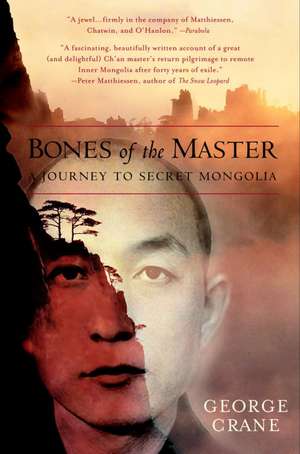
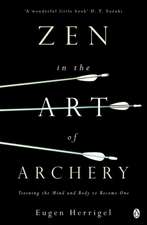

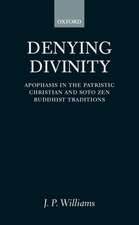

![The Way of Zen =: [Zendao]](https://i0.books-express.ro/bt/9780375705106/the-way-of-zen.jpg)

